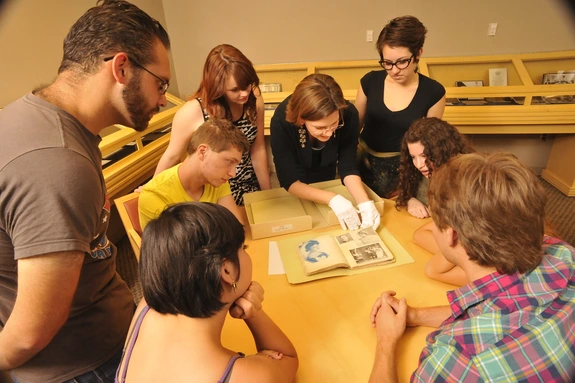
WHY STUDY HISTORY?
“Advice to prospective history majors: Do it. The smartest people I know have an extensive knowledge of history. Few other fields of study will give you such a unique perspective on the world and current events.” –Amanda Ehredt, law student
Who studies history?
History has been one of the core arts and sciences since the founding of North American universities, yet we also are in the vanguard of contemporary interdisciplinary scholarship – scholarship that promotes fresh, innovative ways of looking at the world.
Students of history are drawn to the field for a variety of reasons. Some are deeply personal. A grandfather’s stories of the Great Depression or a friend’s experience of religious persecution may spark a life-long fascination with how history shapes our lives and our sense of identity and place.
For others, the study of history is part of learning to be a good citizen and a tool for framing the moral and ethical standards we apply to our participation in public life.
We also are drawn to history to learn the practical skills required for finding and assessing empirical evidence, weighing opposing interpretations, and putting theory to practice.
Finally, many of us appreciate fine writing and the pleasures of reading a good book as much for its literary merits as its sophisticated historical scholarship.
What skills will I learn?
The major in History teaches you to:
- study the past as it is recorded and remembered.
- challenge your own preconceptions and those of others.
- write clear, well-documented prose.
- do your own historical research, taking advantage of the latest computer facilities in the university's library.
- think logically and analytically.
- recognize and evaluate competing interpretations.
- muster evidence to prove an argument.
- comprehend what you have read.
- exercise a healthy skepticism.
- develop your historical imagination through working with primary source materials.
- appreciate the varieties of human experience
- become a more cosmopolitan citizen of the world.
What can I do with my degree after graduation?
Short answer: anything you want!
A survey of History majors shows history students finding jobs in virtually every sector of the 21st-century economy.
They have shared their passion for history in classrooms, courtrooms, cruise ships, museums, foreign embassies, government offices, newspaper columns, corporate board rooms, and “on the streets” giving walking tours of historical districts.
They have done it by being teachers, photo archivists, Peace Corps volunteers, researchers for non-profit organizations, UNICEF officers, journalists, consultants and more. They're in good company: Famous History majors include world leaders and game changers.
The Career Services Library in the Student Union, suite 411, has numerous resources to assist students with their career paths. These resources include a career and employer library, career planning workshops, “Career Days” in fall and spring, and individual career counseling. For more information, call 510-621-2588, or visit Student Engagement & Career Development.

